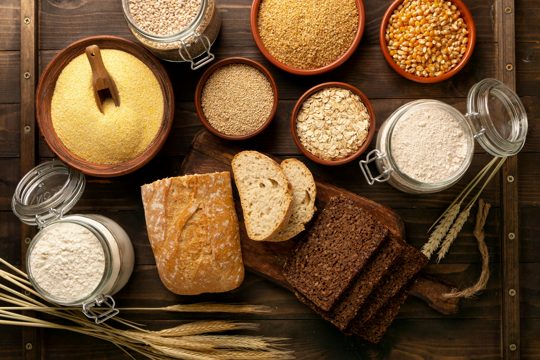Do Older Adults Need More or Less Carbohydrates?
Carbohydrates play a crucial role in everyone's diet, regardless of age. However, for older adults, the question often arises: Do they need more or less carbohydrates? Carbohydrates, often misunderstood, yet a pivotal component in our daily nutritional mix, serve a crucial role in everyone's diet, irrespective of their age.
They are the body's key source of energy, fueling our daily activities, from the most mundane tasks to the most physically demanding endeavors. They are the unsung heroes of our energy balance, quietly keeping us going, day in and day out. However, when it comes to our older adults, the narrative takes a slightly different turn. A question, a conundrum if you will, often rises to the surface: Do they need more or less carbohydrates?This is not a query to be brushed aside lightly, but rather, it calls for a deeper understanding of how our bodies' nutritional needs evolve as we age.

It's a crucial conversation that intertwines the threads of health, wellness and longevity into a tapestry of life quality. It's a dialogue that requires us to look beyond the surface, to dig deeper into the science of aging, the intricacies of metabolism and the delicate balance of diet and exercise.
Reflecting on this, one begins to appreciate the complexity of our dietary needs, and how they change over time. It's a fascinating journey of discovery, one that takes us deep into the heart of what it means to age gracefully, with vitality and good health. So, do our respected elders need more or less carbohydrates? The answer lies not in a simple number, but rather, in a more nuanced understanding of their unique nutritional needs, lifestyle factors, and overall health profile.
Diet Plans and Carbohydrates
While many diet plans recommend cutting out carbohydrates completely, seniors should always be wary of going to such extremes. Carbohydrates are essential for providing the body with the energy it needs to function properly.
Completely eliminating them could lead to nutritional deficiencies and energy loss. Contrary to popular belief, especially with the rise of high-protein, low-carb fad diets, eradicating carbohydrates entirely is not the most beneficial course of action, particularly for seniors. The reason for this lies in the irrefutable fact that carbohydrates are pivotal in supplying the body with the much-needed energy to perform daily tasks and bodily functions efficiently. They are the body's primary fuel source, and without them, it's akin to trying to run a car without gasoline. The engine simply won't function to its full potential. Bearing this in mind, seniors should approach the idea of completely cutting out carbohydrates with a certain level of skepticism. It's crucial to remember that not all carbs are created equal. The key is in differentiating between simple and complex carbs.

Simple carbohydrates like those found in sugary foods and drinks are quickly absorbed by the body and can cause a rapid spike in blood sugar, while complex carbs like whole grains, fruits, and vegetables are digested slowly and provide a steady source of energy. Moreover, the complete elimination of carbs can lead to a myriad of health issues.
Nutritional deficiencies are one of the most alarming. Without carbohydrates, the body lacks essential nutrients like fiber and important vitamins, which can lead to digestive problems, weakened immunity, and even mental fog. Additionally, the absence of carbs can cause a significant energy loss, leading to fatigue and lowered physical activity, which can be detrimental for seniors. In conclusion, it's imperative for seniors to understand that while it's beneficial to monitor and moderate carbohydrate intake, especially of the simple kind, completely expunging them from one's diet may do more harm than good. The key lies in maintaining a balanced diet, rich in complex carbs, that supports overall health and vitality. Balance, not elimination, is the key to healthy aging.
Promote A Feeling Of Fullness
Carbohydrates are known to promote a feeling of fullness. For seniors, maintaining a healthy weight is often a challenge.
Overeating is a common problem that can lead to obesity and related health issues. Including the right amount of carbohydrates in their diet can help older adults feel full and prevent overeating. Carbohydrates, the essential macronutrients, are not just mere substances in your food, they are powerful health boosters that can induce a sensation of satiety. This is particularly beneficial for seniors, who often grapple with the daunting task of weight management. With advancing age, maintaining a healthy weight can transform into an uphill battle, as metabolism slows down and physical activity decreases. Overeating, a frequent issue, can tip the scales towards obesity, paving the way for a plethora of health complications like heart disease, diabetes, and arthritis. Integrating the correct proportion of carbohydrates into their daily meals could be a game changer for older adults seeking to manage their weight.

These potent nutrients work by keeping hunger at bay, decreasing the likelihood of reaching for that extra snack, and hence, curtailing overeating. This can help seniors stay well within their calorie limits, and keep obesity and its associated health hazards at arm's length.
Furthermore, carbohydrates are not just satiety-enhancers, they are also a vital source of energy. They fuel the body, enabling seniors to lead an active and fulfilling life. So while it's essential to keep an eye on carbohydrate intake, it's also crucial to remember that they are a vital part of a balanced, nutritious diet. Hence, the key lies in choosing the right kind of carbohydrates - whole grains, fruits, and vegetables over processed, sugary foods - and incorporating them in the right amounts into one's diet. This way, carbohydrates can help seniors not only feel full and prevent overeating, but also lead a healthier, more energetic life.
Increase Energy Levels
One of the primary functions of carbohydrates is to provide energy. For seniors, this is particularly important as energy levels naturally decline with age.
Including sufficient carbohydrates in an older adult's diet can help offset this decline and keep them feeling energetic and active. One of the primary functions of carbohydrates in our bodies is to act as a powerhouse, providing us with the much-needed energy to perform our everyday tasks. This role of carbohydrates becomes even more critical as we age. For our beloved seniors, maintaining a steady energy level is particularly significant as their vitality naturally diminishes with the passing years. It's a common phenomenon, but it doesn't mean we can't fight against it. By incorporating an adequate amount of carbohydrates into an older adult's diet, we can help counterbalance this decline, thereby ensuring they remain active, lively, and full of life.

However, it's not just about adding carbohydrates, but adding the right ones. While it's true that all carbs break down into glucose, providing the body with its primary source of energy, not all carbohydrates are created equal.
Whole grains, fruits, vegetables, and legumes are excellent sources of complex carbohydrates. These take longer to digest, provide sustained energy, and are packed with additional nutrients and fiber, enhancing overall health and well-being. Therefore, an older adult's diet shouldn't just be about sufficient carbohydrates, but about incorporating the right types of carbohydrates. This small yet significant change can help offset the natural energy decline that comes with age, keeping them feeling energetic, active, and ready to seize the day. So, let's celebrate our seniors not just by helping them stay active, but also by assisting them to enjoy their golden years with the vitality they deserve.
Help With Digestion
Carbohydrates, particularly those found in whole grains, fruits, and vegetables, are high in dietary fiber. This fiber aids in digestion and can help prevent constipation, a common issue among older adults.
A diet rich in these types of carbohydrates can support a healthy digestive system in seniors. Carbohydrates, especially those derived from nutrient-dense whole grains, vibrant fruits, and diverse vegetables, are packed with essential dietary fiber. This fiber serves as the unsung hero of our digestive system, facilitating smoother digestion and providing a natural remedy against constipation. This ailment is particularly prevalent among older adults, causing discomfort and hindering their daily life. By incorporating a diet that is plentiful in these types of carbohydrates, they not only counter constipation but also enhance their overall gut health.

Moreover, this dietetic change can also contribute to a more balanced and well-rounded nutritional intake, fostering better health and increased vitality in the golden years. A mosaic of colorful fruits and vegetables coupled with the earthy goodness of whole grains can add a delightful variety to the palate, making mealtimes more enjoyable.
In essence, a diet rich in such carbohydrates does more than just support a robust digestive system in seniors. It paves the way for a holistic approach to health, rejuvenating their quality of life through improved nutrition, strengthened immunity, and an elevated sense of well-being. This transformable dietary shift can indeed be the cornerstone of a healthier, happier, and more fulfilling lifestyle for seniors. Here ends the completed part.
Provide A Low-Fat Source Of Protein
Some carbohydrates, such as legumes, also provide a low-fat source of protein. This is crucial for seniors, as many struggle with consuming enough protein.
With their dual role, these types of carbohydrates can be a useful addition to an older adult's diet. Indeed, some carbohydrates, like the nutrient-packed legumes, not only serve as an energy source but also as a rich, low-fat provider of protein. This is particularly beneficial for seniors, who may find it challenging to meet their daily protein intake. It's not uncommon for older adults to experience difficulty in digesting and absorbing protein-rich foods, or perhaps they may simply be less inclined towards heavy meals. That's where the magic of these versatile carbohydrates comes into play. With their dual-functionality, these carbohydrates, especially legumes, offer a two-fold nutritional advantage – providing essential energy and simultaneously contributing to the much-needed protein in the diet.

Therefore, incorporating them into an older adult's meals can be a strategic move towards ensuring a balanced diet. But that's not all.
Legumes are also packed with dietary fiber and other beneficial nutrients, making them a powerhouse of health benefits. They can aid in controlling blood sugar levels, promoting gut health, and reducing the risk of heart diseases. So, the next time you're planning a meal for an elderly loved one, consider adding these nutrient-dense carbohydrates. With their plethora of health benefits, they make for an excellent addition to an older adult's diet, ensuring not just variety in taste but also in nutrition.
The Importance of Balance
While carbohydrates are important, they should not be the only focus of a senior's diet. A balanced diet that includes lean proteins, healthy fats, and a variety of fruits and vegetables should also be maintained.
Without a doubt, carbohydrates play a pivotal role in our diets, serving as one of our body’s primary energy sources. However, for seniors, it's paramount that carbohydrates don't become the sole center of attention in their meal planning. Instead, it's essential to strike a harmonious balance with other crucial dietary elements to ensure optimal health and vitality. Incorporating a healthy mix of lean proteins into a senior's diet is a must. Protein doesn't just help repair and build tissues, it also plays a critical role in boosting immunity, promoting muscle strength, and maintaining healthy skin. Including lean sources like poultry, fish, legumes, and low-fat dairy can help seniors derive the maximum benefits without the downside of excessive saturated fats. Healthy fats, too, should form an integral part of a senior's diet.

Often, fats are misunderstood and vilified, but the right kinds of fats - monounsaturated and polyunsaturated fats found in avocados, olive oil, nuts, and fish - can help lower bad cholesterol levels, reduce the risk of heart disease, and support overall brain health. Moreover, variety is the spice of life and the key to a nutrient-rich diet.
A rainbow of fresh fruits and vegetables, packed with essential vitamins, minerals, and fiber, can do wonders for a senior's health. From boosting heart health and improving digestion to enhancing vision and strengthening immunity, the benefits of a varied, colorful diet are manifold. In essence, a balanced diet for seniors is not just about carbohydrates. It's a holistic approach that includes lean proteins, healthy fats, and a plethora of fruits and vegetables, all working in synergy to ensure the best health outcomes. It's about creating a dietary symphony, with each food group playing its part, to keep seniors healthy, energetic, and brimming with life.
Avoiding Simple Carbohydrates
Not all carbohydrates are created equal. Seniors, like everyone else, should aim to limit their intake of simple carbohydrates, such as those found in sugary drinks and processed foods.
These can lead to weight gain and other health problems. It's important to note that not all carbohydrates are created equal. This is a crucial piece of information that everyone, especially seniors, should keep in mind when planning their diets. The key lies in understanding the difference between simple and complex carbohydrates. Simple carbohydrates, often found in abundance in sugary drinks, processed foods, and sweets, are quickly digested by the body, causing a rapid spike in blood sugar levels.

Consuming large amounts of these simple carbs can result in unwanted weight gain and can pave the way to a host of other health problems, including diabetes and heart disease. On the contrary, complex carbohydrates, such as whole grains, fruits, and vegetables, take longer to be broken down by the body, providing a steady, sustained release of energy.
This not only helps to keep your hunger pangs at bay but also ensures a steady blood sugar level, reducing the risk of energy crashes and cravings. So, while it's essential for seniors to monitor their carbohydrate intake, it's equally important to differentiate between the types of carbs they're including in their meals. By reducing the consumption of simple carbohydrates and opting for healthier, complex ones instead, they can help maintain their weight, prevent health complications, and boost their overall well-being. Remember, it's all about balance and making smart food choices, no matter what our age might be.
Focusing on Complex Carbohydrates
Instead, the focus should be on complex carbohydrates, like those found in whole grains, legumes, and fruits and vegetables. These not only provide the necessary energy but also pack in essential nutrients and fiber.
Instead of directing our attention and taste buds towards simple sugars and unhealthy fats, let us shift the spotlight onto complex carbohydrates, the unsung heroes of a balanced diet. These power-packed nutrients, often overlooked, are primarily found in whole grains, legumes, and fruits and vegetables. They serve up not only the necessary energy to keep us active and on our toes throughout the day but also pack a punch with essential nutrients and fiber. Whole grains, for instance, are a rich source of B vitamins, iron, folate, selenium, potassium, and magnesium. They help in maintaining a healthy gut, reducing the risk of chronic diseases, and providing a steady stream of energy. Legumes, on the other hand, are an excellent source of plant-based protein, fiber, and complex carbs.

They are also rich in a variety of nutrients and antioxidants that can effectively combat inflammation and reduce the risk of chronic diseases. Fruits and vegetables, the stars of any diet, are loaded with complex carbohydrates, fiber, vitamins, and minerals.
They have high water content, which makes them incredibly filling, despite being relatively low in calories. By incorporating a variety of colorful fruits and vegetables in our diet, we ensure a rich intake of different nutrients, each with its unique benefits, contributing to overall health and wellbeing. These nutrient-dense foods not only help meet our daily energy requirements but also help in maintaining optimal health and preventing various diseases. So, let's ditch the empty calories and embrace complex carbohydrates, the real game-changers of our diet, to lead a healthier and more energetic life.
Consulting with a Healthcare Professional
Before making any significant changes to their diet, seniors should consult with a healthcare professional. They can provide personalized advice based on the individual's health, lifestyle, and dietary needs.
Before making any substantial alterations to their dietary habits, it is imperative that seniors consult with a trusted healthcare professional. This is an important step as it ensures that their unique health needs, lifestyle habits, and nutritional requirements are taken into account. Healthcare professionals have a wealth of knowledge and experience and they can provide invaluable, personalized advice for seniors. They are able to assess an individual's medical history, current health status, and future health risks. This in-depth evaluation would allow them to tailor dietary advice to suit the individual's specific needs and circumstances.

Furthermore, they can also provide comprehensive guidance on how to incorporate these dietary changes into their lifestyle in a sustainable and manageable way. They can offer practical tips and strategies to make the transition smoother, such as suggesting healthy substitutes for favorite foods, recommending portion sizes, and providing advice on reading food labels.
In addition to dietary changes, healthcare professionals can also advise on the importance of pairing a balanced diet with regular physical activity. They can provide insights on safe and effective exercises that complement the individual's dietary plan and overall health goals. Therefore, before embarking on any significant diet changes, seniors should make it a priority to consult with a healthcare professional. This will ensure they are making informed and beneficial decisions that will support their overall health and wellbeing in the long run.
Conclusion
In conclusion, while many diet plans may recommend reducing carbohydrate intake, it's important for seniors to understand the role carbohydrates play in their health. Including the right types and amounts of carbohydrates can help promote a feeling of fullness, increase energy levels, aid in digestion, and provide a low-fat source of protein.
In conclusion, it is imperative to acknowledge that, while numerous diet plans out there may advocate for a reduction in carbohydrate intake, it is vital for our senior citizens to truly comprehend the significant role these macronutrients play in maintaining their overall health and well-being. Carbohydrates, often misunderstood, are not the enemy to a healthy diet, but rather an essential component that can provide a range of benefits when included in the right proportions and forms. Including the right types and amounts of carbohydrates in a senior's diet can make a world of difference. First and foremost, carbohydrates can help promote a feeling of fullness or satiety. As we age, our metabolic rates naturally decline, and we may not require as many calories as we once did. However, feeling of hunger may still persist, leading to overeating and subsequent weight gain. By including complex carbohydrates such as whole grains, legumes, and fruits in one's diet, seniors can keep feelings of hunger at bay, thereby maintaining a healthy weight and avoiding the health complications associated with obesity. Moreover, carbohydrates are an excellent source of energy. They are the body's preferred fuel source, and including them in the diet can keep seniors feeling energetic and vibrant, even as they age.

This is particularly crucial for seniors who maintain an active lifestyle or those who may be fighting off illness, as adequate energy stores can help the body function optimally and recover more rapidly. Furthermore, carbohydrates aid in digestion by providing dietary fiber.
As we age, our digestive systems can slow down, leading to issues such as constipation. Including fiber-rich carbohydrates in the diet can help promote regular bowel movements and overall digestive health, thereby reducing the risk of uncomfortable and potentially dangerous digestive issues. Lastly, carbohydrates can also provide a low-fat source of protein. While it's true that carbohydrates are primarily a source of energy, certain types, such as legumes and whole grains, also contain a notable amount of protein. This is particularly beneficial for seniors who may struggle to meet their protein needs due to reduced appetite or dietary restrictions. In essence, while it is easy to be swayed by the latest diet trends, it is crucial for seniors to understand that carbohydrates are not just beneficial, but necessary for maintaining optimal health and wellness. By including the right types and amounts of carbohydrates in their diet, they can reap the benefits of this versatile macronutrient and enjoy a healthier, more vibrant life.
About us
Welcome to SeniorCaresHub! Welcome to our comprehensive senior care destination! We pride ourselves on being a trusted resource for all things related to caring for aging loved ones. We understand the unique needs and challenges that come with senior care, and our mission is to provide you with the information, resources, and support you need to confidently navigate this journey and help you provide the best possible care for your aging loved one.

